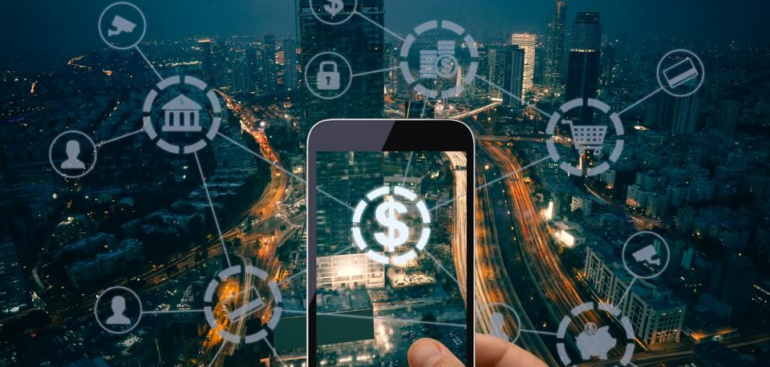Dubai is leading the charge in blockchain adoption, not only in the Middle East but on a global scale. With its ambitious Dubai Blockchain Strategy, launched in 2016, the city has positioned itself as a global hub for blockchain technology, leveraging its potential to revolutionize governance and enhance transparency. The strategy, developed by the Smart Dubai Office in collaboration with the Dubai Future Foundation, aims to make Dubai the first city fully powered by blockchain by 2025.
This move toward blockchain is not just a technological upgrade; it reflects Dubai’s commitment to innovation, efficiency, and trust in its governance systems. The adoption of blockchain across various sectors is set to reshape how the government interacts with its citizens and businesses, setting a new standard for transparency, accountability, and operational efficiency.
Dubai’s Blockchain Vision: A Future of Decentralized Governance
The core of Dubai’s blockchain vision is to create a paperless, efficient government where data is secure, transactions are transparent, and processes are seamless. By 2025, Dubai aims to conduct all government transactions using blockchain, eliminating paper-based processes and streamlining operations.
According to Her Excellency Dr. Aisha Bin Bishr, Director General of the Smart Dubai Office, “Blockchain is the future of cities, and Dubai is well on its way to becoming the first city in the world to fully embrace this disruptive technology across all levels of government and industries.”
The promise of blockchain technology lies in its decentralized ledger, which records data in a secure, transparent, and immutable way. This ensures that information cannot be altered or tampered with, making it ideal for a wide range of government applications—from property transactions to healthcare records, supply chain management, and identity verification.

Key Areas of Blockchain Implementation in Dubai
Dubai’s government has identified multiple areas where blockchain can significantly enhance transparency and efficiency:
1. Real Estate Transactions:
Dubai’s Land Department was one of the first government entities to adopt blockchain, streamlining property transactions. Blockchain enables property buyers and sellers to verify ownership, process payments, and sign contracts digitally, reducing paperwork and the need for intermediaries. This results in faster transactions and enhanced security.
According to the Dubai Land Department, over $1 billion in real estate transactions have been facilitated through blockchain technology, cutting transaction times and lowering administrative costs.
2. Smart Contracts in Legal Framework:
Blockchain’s smart contract feature allows for automated, self-executing contracts with terms written into code. The Dubai International Financial Centre (DIFC) has been experimenting with smart contracts for legal agreements, which can drastically reduce the time and costs associated with dispute resolution and contract management.
3. Healthcare Records:
The Dubai Health Authority (DHA) has adopted blockchain to create a unified system for storing medical records. This system allows healthcare providers to access a patient’s complete medical history securely and instantaneously, improving accuracy in diagnosis and treatment, while ensuring data privacy.
This is a breakthrough for both patients and doctors, ensuring that records are tamper-proof and readily available, especially for emergencies.
4. Identity and Verification:
Dubai’s Digital Identity Project—dubbed UAE Pass—is integrating blockchain to create a unified digital identity that citizens and residents can use to access government services. This blockchain-backed ID system ensures that personal information is securely stored and accessible only to the user and authorized parties.
This technology eliminates the need for multiple usernames, passwords, and physical ID cards. As a result, the government can offer seamless public services, ranging from healthcare to education, using a single blockchain-based identity system.
5. Supply Chain Transparency:
Blockchain is also making strides in Dubai’s logistics and trade sectors, with the Dubai Customs and Dubai Ports World adopting blockchain to track goods through the supply chain. The technology ensures that every step of a product’s journey—whether it’s from a factory in China to a store in Dubai—is recorded in a tamper-proof ledger. This not only increases transparency but also helps in reducing fraud, counterfeiting, and disputes.
Dubai’s Global Blockchain Council estimates that blockchain could save the logistics industry billions by increasing transparency and reducing administrative bottlenecks in international trade.
How Blockchain is Enhancing Transparency
One of the most significant advantages of blockchain technology is its ability to foster transparent governance. In traditional systems, data is often stored in centralized databases, which are vulnerable to tampering, hacking, and corruption. Blockchain’s decentralized nature ensures that no single entity has control over the entire database, making it impossible to alter or delete records without leaving a trace.
For Dubai, this has profound implications for building trust between the government, businesses, and citizens. Blockchain’s immutability ensures that every transaction or interaction with the government is permanently recorded and can be audited at any time. This leads to higher accountability and reduces the potential for corruption, fraud, or administrative errors.
The public can have full confidence that government services are being executed fairly and efficiently. For example, citizens can track the status of real estate transactions, verify the authenticity of official documents, or even ensure that their vote in an election is counted properly, all thanks to blockchain’s transparency.

Challenges Ahead: Scalability and Adoption
Despite the ambitious vision, blockchain adoption in Dubai is not without its challenges. One of the primary issues is scalability. As more services move onto blockchain, the system needs to handle vast amounts of data efficiently without slowing down. Ensuring the technology can scale to meet the demands of a growing city is a top priority for Dubai’s tech teams.
Another challenge is public adoption. Blockchain is still a relatively new technology, and many citizens and businesses are not familiar with how it works. To address this, Dubai’s government has initiated several educational campaigns and partnerships with universities to promote blockchain literacy.

The Future of Blockchain in Dubai: 2025 and Beyond
Dubai’s commitment to becoming the first fully blockchain-powered city by 2025 is more than just a lofty goal; it’s a blueprint for the future of governance globally. As the world moves toward a digital-first mindset, Dubai’s early adoption of blockchain puts it at the forefront of transparent, efficient, and accountable governance.
By integrating blockchain into the core of its public services, Dubai is setting a precedent that other cities around the world may soon follow. Whether it’s ensuring fair elections, speeding up legal processes, or providing tamper-proof medical records, blockchain technology has the potential to reshape how governments interact with their citizens.
As His Highness Sheikh Hamdan bin Mohammed bin Rashid Al Maktoum, Crown Prince of Dubai, aptly stated, “Dubai’s Blockchain Strategy is not just about adopting new technology. It’s about building trust, securing our data, and empowering our citizens. We are not just embracing the future—we are building it.”
Conclusion
Blockchain is more than just a buzzword in Dubai; it is a core part of the city’s future. By 2025, Dubai aims to be a global leader in blockchain-powered governance, setting a new standard for transparency, security, and efficiency. While there are still challenges to overcome, Dubai’s forward-thinking approach and commitment to innovation ensure that blockchain will play a key role in shaping the city’s digital future.
As the rest of the world watches closely, Dubai is not just using blockchain to enhance governance—it’s creating a blueprint for the cities of tomorrow.
Image Courtesy Notice
At The Storiez, we value the efforts of photographers, artists, and content creators. The images featured in our articles are sourced from various news portals and online websites. We strive to ensure proper credit is given wherever possible. If you are the rightful owner of any image used here and would like to request its removal or correct attribution, please feel free to contact us. We respect intellectual property rights and aim to address concerns promptly.

